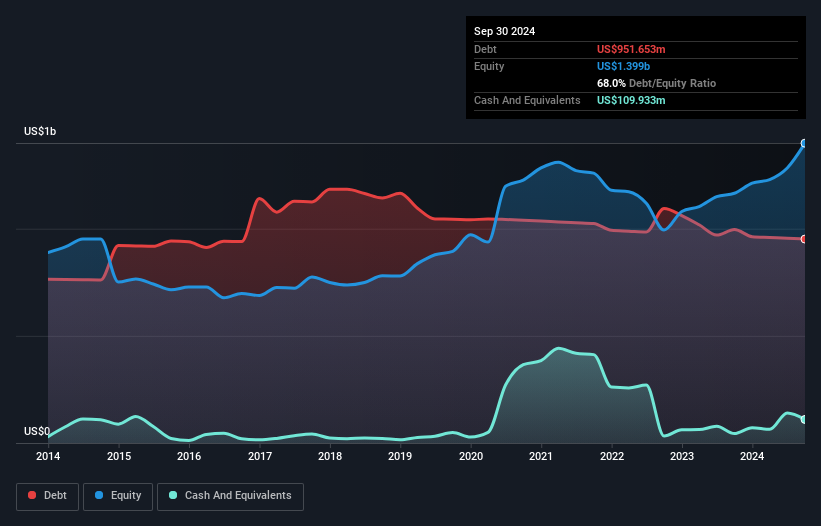- United States
- /
- Consumer Services
- /
- NYSE:BFAM
Is Bright Horizons Family Solutions (NYSE:BFAM) A Risky Investment?

Howard Marks put it nicely when he said that, rather than worrying about share price volatility, 'The possibility of permanent loss is the risk I worry about... and every practical investor I know worries about.' So it might be obvious that you need to consider debt, when you think about how risky any given stock is, because too much debt can sink a company. As with many other companies Bright Horizons Family Solutions Inc. (NYSE:BFAM) makes use of debt. But is this debt a concern to shareholders?
When Is Debt A Problem?
Debt and other liabilities become risky for a business when it cannot easily fulfill those obligations, either with free cash flow or by raising capital at an attractive price. If things get really bad, the lenders can take control of the business. However, a more usual (but still expensive) situation is where a company must dilute shareholders at a cheap share price simply to get debt under control. Of course, debt can be an important tool in businesses, particularly capital heavy businesses. When we think about a company's use of debt, we first look at cash and debt together.
Check out our latest analysis for Bright Horizons Family Solutions
What Is Bright Horizons Family Solutions's Debt?
As you can see below, Bright Horizons Family Solutions had US$951.7m of debt at September 2024, down from US$995.9m a year prior. However, it does have US$109.9m in cash offsetting this, leading to net debt of about US$841.7m.

How Healthy Is Bright Horizons Family Solutions' Balance Sheet?
We can see from the most recent balance sheet that Bright Horizons Family Solutions had liabilities of US$666.9m falling due within a year, and liabilities of US$1.85b due beyond that. Offsetting these obligations, it had cash of US$109.9m as well as receivables valued at US$231.5m due within 12 months. So its liabilities outweigh the sum of its cash and (near-term) receivables by US$2.17b.
While this might seem like a lot, it is not so bad since Bright Horizons Family Solutions has a market capitalization of US$6.05b, and so it could probably strengthen its balance sheet by raising capital if it needed to. But we definitely want to keep our eyes open to indications that its debt is bringing too much risk.
We measure a company's debt load relative to its earnings power by looking at its net debt divided by its earnings before interest, tax, depreciation, and amortization (EBITDA) and by calculating how easily its earnings before interest and tax (EBIT) cover its interest expense (interest cover). Thus we consider debt relative to earnings both with and without depreciation and amortization expenses.
Bright Horizons Family Solutions's net debt is sitting at a very reasonable 2.3 times its EBITDA, while its EBIT covered its interest expense just 5.2 times last year. While that doesn't worry us too much, it does suggest the interest payments are somewhat of a burden. Pleasingly, Bright Horizons Family Solutions is growing its EBIT faster than former Australian PM Bob Hawke downs a yard glass, boasting a 103% gain in the last twelve months. When analysing debt levels, the balance sheet is the obvious place to start. But it is future earnings, more than anything, that will determine Bright Horizons Family Solutions's ability to maintain a healthy balance sheet going forward. So if you're focused on the future you can check out this free report showing analyst profit forecasts.
Finally, a business needs free cash flow to pay off debt; accounting profits just don't cut it. So the logical step is to look at the proportion of that EBIT that is matched by actual free cash flow. Over the last three years, Bright Horizons Family Solutions recorded free cash flow worth a fulsome 94% of its EBIT, which is stronger than we'd usually expect. That positions it well to pay down debt if desirable to do so.
Our View
Happily, Bright Horizons Family Solutions's impressive conversion of EBIT to free cash flow implies it has the upper hand on its debt. And that's just the beginning of the good news since its EBIT growth rate is also very heartening. When we consider the range of factors above, it looks like Bright Horizons Family Solutions is pretty sensible with its use of debt. That means they are taking on a bit more risk, in the hope of boosting shareholder returns. When analysing debt levels, the balance sheet is the obvious place to start. However, not all investment risk resides within the balance sheet - far from it. For example, we've discovered 2 warning signs for Bright Horizons Family Solutions that you should be aware of before investing here.
If you're interested in investing in businesses that can grow profits without the burden of debt, then check out this free list of growing businesses that have net cash on the balance sheet.
Valuation is complex, but we're here to simplify it.
Discover if Bright Horizons Family Solutions might be undervalued or overvalued with our detailed analysis, featuring fair value estimates, potential risks, dividends, insider trades, and its financial condition.
Access Free AnalysisHave feedback on this article? Concerned about the content? Get in touch with us directly. Alternatively, email editorial-team (at) simplywallst.com.
This article by Simply Wall St is general in nature. We provide commentary based on historical data and analyst forecasts only using an unbiased methodology and our articles are not intended to be financial advice. It does not constitute a recommendation to buy or sell any stock, and does not take account of your objectives, or your financial situation. We aim to bring you long-term focused analysis driven by fundamental data. Note that our analysis may not factor in the latest price-sensitive company announcements or qualitative material. Simply Wall St has no position in any stocks mentioned.
About NYSE:BFAM
Bright Horizons Family Solutions
Provides early education and childcare, back-up care, educational advisory, and other workplace solutions services for employers and families in the United States, Puerto Rico, the United Kingdom, the Netherlands, Australia, and India.
Solid track record with moderate growth potential.
Similar Companies
Market Insights
Community Narratives



